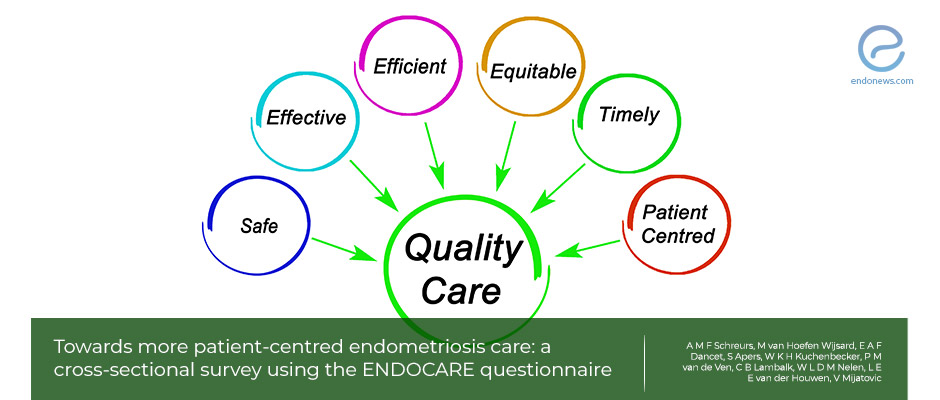Patient-centered care in patients with endometriosis
Aug 17, 2020
Patient-centered endometriosis care could be evaluated and improved by the use of ENDOCARE questionnaire
Key Points
Highlights:
- ENDOCARE questionnaire is a feasible tool to improve the results of patient-centered endometriosis care.
Importance:
- Patient-centered endometriosis care could be evaluated and improved by the use of ENDOCARE questionnaire.
What’s done here?
- This cross-sectional cohort study was conducted in two endometriosis care centers between 2015 and 2016.
- The patients who consulted with suspicious complaints about endometriosis to a secondary care center and a tertiary care center were investigated.
- ENDOCARE questionnaire and a short questionnaire sent to the study population to evaluate the patient-centered endometriosis care in 38 aspects.
- The overall patient-centredness score is the primary outcome; strengths and targets for improvement in endometriosis care in endometriosis care centers were also assessed.
Key results:
- Four-hundreds and seven patients met the eligibility criteria for the study, 234 patients responded to the questionnaires, and data from 209 patients were analyzed.
- Longer doctor-related diagnostic delay, having more often asked a second opinion from at least one gynecologist, and having more often been referred to other specialists due to endometriosis-related symptoms were found in the patients from the tertiary care center; but there was no significant difference between the responders and non-responders.
- There was no significant difference regarding the mean patient-centredness score between the two care centers.
Strengths and Limitations
- The retrospective design is the limitation of the study, but the inclusion of surgically proven endometriosis is the main strength.
Lay Summary
The women with endometriosis suffer from several symptoms and signs including dysmenorrhea, dyspareunia, chronic pelvic pain, and infertility which have a detrimental effect on their quality of life. Endometriosis is diagnosed with 7-10 years of delay due to the absence of non-invasive diagnostic markers resulting in frequent consultations with the clinicians. Because of the high anxiety and depression scales in these women, the patient-centered endometriosis care is important, and usually the preferred approach.
Schreurs et al., two groups of scientists from Netherlands and Belgium, published a study titled “Towards more patient-centered endometriosis care: a cross-sectional survey using the ENDOCARE questionnaire” in the journal named "Human Reproduction Open".
The authors sought to investigate the performance of patient-centered endometriosis care in both secondary and tertiary care centers. Two questionnaires have been used to evaluate the strengths and targets for the improvement of patient-centered endometriosis care, namely ENDOCARE and the short questionnaire. ENDOCARE questionnaire is a reliable and validated tool to measure and improve the results of patient-centered endometriosis care.
Four-hundreds and seven patients having surgically proven endometriosis met the eligibility criteria for the study, 234 patients responded to the questionnaires, and data from 209 patients were analyzed. When compared to the respondents from different endometriosis care centers, the patients from the tertiary care center were older, more parous, and had a higher level of education. Longer doctor-related diagnostic delay, having more often asked a second opinion from at least one gynecologist, and having more often been referred to other specialists due to endometriosis-related symptoms were found in the patients from the tertiary care center. There was no significant difference between the responders and non-responders.
“The ENDOCARE questionnaire, with a few minor advised alterations to the background questions, appears to be a useful tool for investigating patient-centredness and should be used as a tool to follow-up quality of improvements of care.” the authors added.
Research Source: https://pubmed.ncbi.nlm.nih.gov/32695888/
endometriosis quality of care patient-centredness ENDOCARE questionnaire

